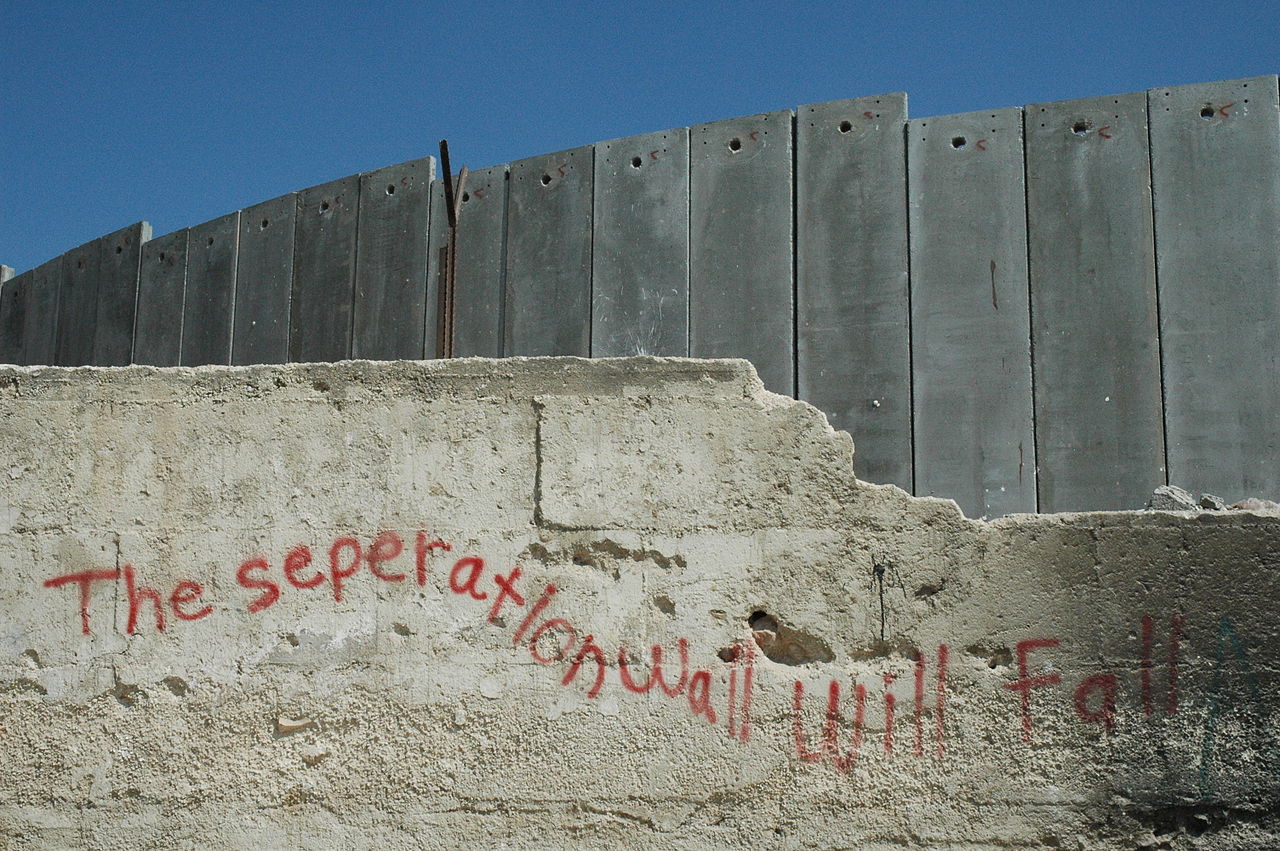Written by Selma Aalachi
With a third of the world’s countries constructing barriers along their borders, the promise by Donald Trump to build a wall along the border between US and Mexico isn’t precisely a new idea. As a matter of fact, mankind has from early history to modern times built barriers with the aim to protect and demarcate. When the Berlin wall was demolished in the year of 1989, there were approximately 16 border fences around the world. Today, more than 40 states have built barriers against their neighbouring countries. Some of them are completed, while others are still under construction. One such example is the Israeli West Bank barrier.
As an attempt to prevent Palestinian terrorists from entering Israel, the Israeli government began constructing a barrier in 2002. The barrier divides the West Bank and is a network of concrete walls, fences and closed military roads. In some places, it is as high as 8 meters, making it twice as high as the Berlin Wall (the average height of the Berlin Wall was 3.6 meters). The West Bank barrier is also expected to reach at least 650 kilometers in length, making it not only twice as high as the Berlin Wall, but also four times as long. The Barrier will also be more than twice as long as the internationally recognised Green Line, which was supposed to outline the border between Israel and West Bank.
The Israeli government argues that the Barrier has a pivotal defensive purpose. They indicate that the number of Palestinian attacks have decidedly decreased on their soil since the beginning of its construction, as proof of its effectiveness. To emphasize its association with security, its proponents terms it the “Security-,” or “Anti-Terrorist Fence”. The term “fence” is ostensibly less correlated with dictatorial power, but rather with the belief that “good fences make good neighbours.”
On the other hand, for the opponents of the Barrier it is the “Separation-,” “Colonisation-,” or “Apartheid Wall,” as it infringes Palestinian territory, restricts freedom of movement and demolishes communities. The phrase ‘wall’ evokes negative connotations equated with dictatorial power and perpetual segregation. Additionally, because 85 per cent of the Barrier runs inside the West Bank, many consider it to be an impediment to the desire of establishing a viable state of their own. The international Court of Justice (ICJ) has stated that the wall should be dismantled, because it is constructed on occupied Palestinian territory. According to international law, no country has the right to act outside its sovereign territory. Therefore, in compliance with the fourth Geneva Convention, the Israeli West Bank barrier is illegal. Yet, the wall is expanding, just like the rest of the walls around the world.
Border walls and fences may not be a new phenomenon, but the rate at which they’re coming to being is assuredly anomalous; as it is the fastest rate since the Cold War. But Israel is not only separating themselves from the West Bank, it is also building a concrete wall along the Gaza Strip. The country is additionally planning to wall itself off from the surrounding Arab states, becoming a fortress-like nation. The Prime Minister, Benjamin Netanyahu, has described the surrounding Arab states as ‘wild beasts’, which Israel needs to protect itself from. Moreover, let us not forget about the Egypt-Gaza barrier or the barbed-wire fence that India is constructing around Bangladesh. Turkey is building a concrete wall along its entire border with Syria. Hungary is planning to construct a second wall on its southern border with Serbia, while the Estonian government has approved the building of a fence along its border with Russia. Europe will shortly have a greater amount of border barriers than what it had during the Cold War.
The perception of boundaries performs a leading role in the conflict of nation building, territory and resources within Middle East. The reasoning behind this view is based on the concept of the nation-state, where every population should have their own territory and where no foreigners are allowed to intervene in their internal affairs. In the opinion of realism, the dominant school of thought in International Relations theory, states are central actors which operate in an anarchic system. Because states desire to guard their sovereignty, the primary motive is state survival. States will endeavour to gain power at the expense of their rivals. If Israel is to become more powerful, that necessarily means the loss of land for Palestine. This explains why the wall has shifted the borders. It can be argued that Israel is building the Barrier with the purpose of offering their people protection from the ravages of an insecure international system; especially being the only country in the world with a Jewish majority.
Nevertheless, there are those who argue that walls and border fences don’t work. Because terrorist groups, for example, have the resources to enter by safer methods, they are not affected by walls. They are able to shoot rockets over the fence or to dig tunnels under it. They also manage to trespass by using fake documents. West Bank Palestinians still manage to enter Israel on a daily basis in hopes of work, to harvest their fields, to visit their families or to attend prayers at the Al-Aqsa Mosque.
So if the West Bank barrier doesn’t stop terrorists or undocumented workers, nor outlines a substantial border – then what is it for?
Security theatre could be one explanation. The phrase refers to actions taken by the government with the purpose of making citizens feel safer by seeing something being dealt with; even though that action generates a negligible contribution to the general efforts of truly keeping the population safe. Security theatre provide the sense of security, not actual security. The state, by demonstrating sovereignty, simultaneously reifies authority over that territory and defines the limits of the people that are situated there. This differentiation stimulate more passionate feelings of belonging to the in-group, as well as the separation from the other on the outside. The creation of an ‘us’ can only exist by its separation of a ‘them’. By creating distinct territories, when dividing the two populations, it demonstrates what Israels is and what it is not.
Many argue that the Barrier’s real raison d’être is to create facts on the ground, or what is better known as expansionism. Without delving into the complicated, notwithstanding interesting, past, a vital fact is the close correlation in Israeli history between ideological goals and the advanced practical actions. When the Zionist movement began to promote Jewish resettlement of Palestine in the nineteenth century, the settlement policy had three primary goals: the establishment of conterminous sections of settlement, the purchase of rural land and the expansion of the territory that would help to delineate the future boundaries of the state.
Invariably, border fences and barriers are justified in the language of security. It has long been a toon in regulating, or attempting to regulate, human passage and defending territory by the construction of walls. But wasn’t this supposed to be a new era in global affairs? An era in which the national borders were softened because of international financial interdependence? Globalization was supposed to tear down barriers and bring people of different ethnicity together, not to create new walls.
According to the Universal Declaration of Human Rights, every human being has the right to life, freedom and legal security. The Berlin Wall became an emblem for state violence, oppression and denial of human rights. Even though the West Bank barrier has made it more difficult for terrorists to reach their target, and Palestinian attacks have almost entirely disappeared since the construction begun, correlation doesn’t necessarily equal causation. Even though a wall offers more security than no wall, they do little to address the roots of insecurity and migration. The West Bank barrier, in its current aggressive route, may severely harm the peace process and stimulate terrorism. It has destroyed Palestinian neighbourhoods, restrained the economy and illegally occupied land. So whether we choose to see the West Bank barrier as simply a security matter or as a symbolism of modern apartheid, the Barrier is sure to play a vital role in the complex process of territorial negotiation related to the Israel-Palestine conflict as a whole.





